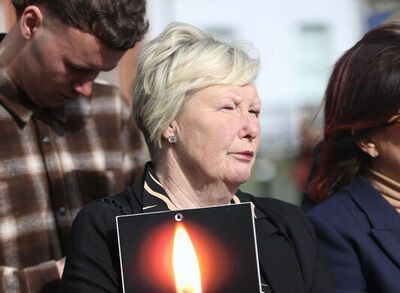[caption id="attachment_71524" align="aligncenter" width="600" caption="Maxine Linehan in "Brontë; a Portrait of Charlotte.""]
"Brontë; a Portrait of Charlotte" * By Willam Luce * Directed by Timothy Douglas * Starring Maxine Linehan * Theater 511, West 54th St., at 10th Ave., NYC. * Selected dates through May 25
A solo show befits the solitary existence of Charlotte Brontë, at least when we find her in "Brontë; a Portrait of Charlotte." It is July1849, and the author of "Jane Eyre," now 33, has within the past 10 months, buried her sister Emily, of "Wuthering Heights" fame, her sister Anne, a less known writer, and their brother Branwell. Her two other siblings died in childhood; her mother in 1821, when Charlotte was five.
Charlotte is depleted by death and loath to return home to the tiny village of Haworth, and the parsonage now occupied only by her father, she tells a friend in a letter. Patrick Brontë is a man "hard as flint," whose church when empty is said to have "a full congregation." It is full, however, of dead bodies, buried under the aisle, and Charlotte faces the desolate prospect of years worshipping, knowing that "your loved ones are moldering under your knees."
She clings on like a tiny heather bush buffeted by the "merciless winds" of her beloved Yorkshire moors. She longs for "a time of kindness, a time of gentleness," repeating this phrase like a mantra.
The personal success that has eluded her, despite her public success, is all she seems to care for now. The door isn't even opened to callers in search of the famous author. (The real identities of the Brontë sisters, all published under male pseudonyms, has emerged.)
Another caller - will he, won't he? - is the source of the dramatic "action" of the play. Arthur Bell Nicholls, her father's curate, and a fellow Irishman, has said he would call that night. Charlotte feels sure he has a special reason. In the arc of the play she goes from mocking the rumors that the two were to wed, through the tension produced by several false-alarm knocks at the door and on to a seeming conviction that this is what she wants.
Similarly we share in the dramatic revelation to herself of why she so resented her opium-addicted brother, a tortured homosexual. Branwell had an adulterous affair with the wife of his employer, whereas Charlotte's passion for the married proprietor at the language school in Brussels, where she once worked, was unrequited. Charlotte's resentment was cured only by Branwell's death, she says, in the most moving scene of the play, adding, "It is not until the last that we know how much we can forgive."
Charlotte forgives Mr. Nicholls his physical imperfections for his "kind eyes," in a scene almost as funny as the earlier one was sad. The knock comes.
The play ends with a TV screen providing the audience with newsflashes. Charlotte declines Mr. Nicholls proposal. Charlotte relents. Charlotte dies nine months after they marry. Why did the newsflash omit the major fact that Charlotte was pregnant? An odd choice, using a device that felt like an awkward imposition of modernity into this period piece. Providing context amplified the play's impact, but a voiceover might have been better.
There were a couple of small, annoying details about the staging: a cloak described as "ruined" that looks perfect; a supposedly beet-stained letter, ridiculously overdone.
However, the use of empty picture frames around the set was effective in suggesting mental life projected, just as the Bronte's created imaginary worlds to compensate for their barren surroundings. When Charlotte first appears in her hooded robe (death shroud?) in a cameo frame, she evokes the cover of the Penguin Classics books, where many first encountered her.
Linehan is wonderful in bringing Charlotte to life. She did not get the standing ovation deserved on a recent evening. Was it that the audience is more inhibited in a small venue? Or, were they paralyzed by the concluding note that death conquers all?
"Brontë: a Portrait of Charlotte" will be performed on May 9, 10, 11, 16, 17, 18, 19 (at 3 p.m. and 8 p.m.), 23, 24 and 25.










